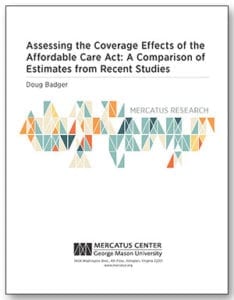
The Affordable Care Act (ACA) has taken center stage as the Trump administration promises to repeal it. In response, proponents of the ACA argue that it extended health insurance coverage to as many as 20 million people, many of whom could lose coverage if the ACA were repealed.
In “Assessing the Coverage Effects of the Affordable Care Act: A Comparison of Estimates from Recent Studies,” Galen Institute Senior Fellow Doug Badger analyzes the effects of the ACA on health insurance coverage in America. Badger reviews recent data and concludes that the popular estimate of 20 million adults gaining coverage from the ACA is likely overstated.
- The claim that the ACA has resulted in coverage increases of 20 million nonelderly adults since its enactment is likely overstated. The ACA’s greatest effects on coverage occurred in 2014 and 2015 when its major provisions took effect. According to the National Health Interview Survey, the number of covered adults age 18–64 increased by 16.5 million over that two-year period.
- Government providers such as Medicaid are by far the largest source of coverage for newly covered adults. Although most of the ACA debate concerns its effect on individual health insurance markets, higher Medicaid and Children’s Health Insurance Program (CHIP) enrollment accounts for 84 percent of the net coverage gains for those under age 65.
- Roughly half the Medicaid and CHIP growth attributable to the ACA occurred among those who were already eligible under pre-ACA standards. These individuals are unlikely to lose their coverage if the ACA is repealed.
- Coverage is likely to decline even in the absence of repeal. Instability in insurance markets has caused numerous insurers to withdraw from the individual exchanges in 2017. It is quite likely that there will be further insurer withdrawals in 2018 even if the status quo is maintained, and that some areas—and potentially entire states—will have no exchange- based coverage.
